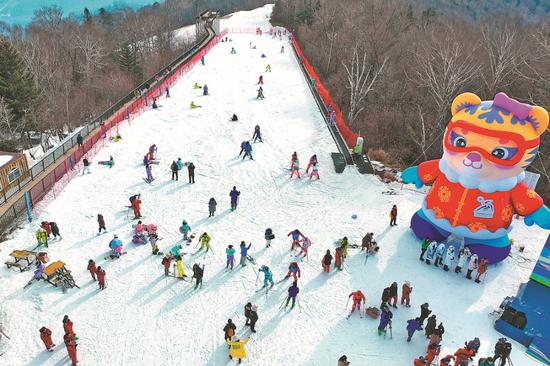Cold thrills or warm escapes?
Every November, the debate begins anew: will it be a warm or cold winter?
This year, the China Meteorological Administration added a twist to the discussion. On Oct 29, it forecast higher-than-usual average temperatures for winter 2024-25, but warned of sharp fluctuations and the likelihood of strong cold spells.
To many, that sounds like a classic cold winter ahead.
With freezing temperatures settling in, there are two main ways to embrace the season: diving into icy adventures or seeking warmth and comfort.
For thrill-seekers, ski resorts, snow amusement parks and even indoor simulation skiing studios, offer ample opportunities to enjoy the speed and chill of the snow season.
For those leaning toward coziness, hot springs, hot pot feasts, hot milk tea and insulated winter wear — especially down jackets — are all the rage.
To start with, hot pot is the quintessential winter dining experience. Traditional Sichuan and Chongqing spicy hot pot continue to dominate, but new flavors are catching on. Hong Kong-style hot pots and beef and mutton variations are gaining popularity, thanks to their warm, nourishing appeal. Hot pot delivery services are also thriving, making it easier for families and friends to gather around a steaming pot without leaving their homes.
Hot tea and coffee drinks have also rolled out new products with winter flavors to gain growth. Chagee, the milk tea chain, recently launched its first yellow milk tea product nationwide. This new product features yellow tea from Anhui province, paired with black rice, buckwheat and milk, and has a strong "baked rice aroma". The sales of hot tea products in November increased by 22 percent compared to that of September. Taking Jiangsu province as an example, hot tea products of Chagee reached 50 percent of its total sales, said the company.
Beyond food and drinks, hot springs and sweat steaming are becoming top choices for relaxation. Northern cities like Shenyang, Liaoning province, and Zhengzhou, Henan province, are leading this trend, but southern cities such as Suzhou and Nanjing of Jiangsu province, are catching up, with searches for hot springs and sweat steaming increasing by over 300 percent in some areas.
For those who prefer to escape the cold altogether, warm-weather destinations like Sanya in Hainan province, Kunming and Dali in Yunnan province, are drawing "migratory birds" from across the country. These cities offer not only mild climates, but also picturesque scenery and a slower pace of life.
The rise of the "healing economy" is another development.
Practices like Zen therapy, aromatherapy and singing bowl meditation are gaining traction, with dedicated spaces and even healing-themed homestays popping up. These experiences cater to a growing desire for self-care and emotional well-being.
Even in the cold, outdoor activities with families and friends are thriving. Barbecues, strawberry picking and stove-side tea gatherings are all seeing increased interest. Parents in particular are embracing outdoor family activities, using them as an opportunity to connect with nature, breathe fresh air and strengthen bonds.
Winter travel isn't limited to traditional holidays anymore, either. More people are seizing the chance to turn ordinary weekends into micro-vacations, fueling demand for nearby destinations that offer both adventure and relaxation.
My friend Yuan Yuan runs a European-style boutique homestay hotel, The Long Circle in the suburbs of Yanqing district, Beijing. Recently, her phone hasn't stopped ringing, as her 26-room inn has been bustling with skiers visiting the nearby ski resorts including the National Alpine Skiing Centre.
For her, winter isn't about enduring the cold — it's more about embracing it. "This season offers something for everyone, from the adrenaline of skiing down a slope to the communal joy of a hot meal," she said.
As temperatures continue to drop, one thing is certain: winter has transformed into a season of economic vitality.

